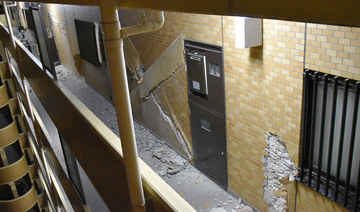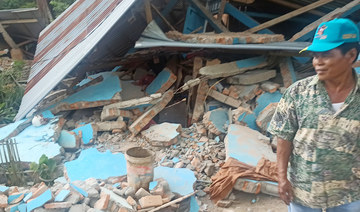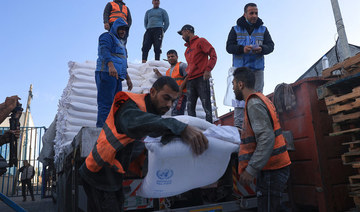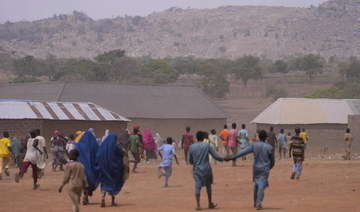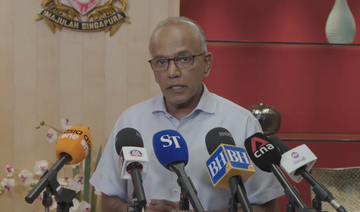TOKYO: Thousands of Japanese households remained without power on Thursday as companies worked to assess damage the morning after a powerful quake hit the northeast coast of Japan, leaving at least four dead and nearly 100 injured, some seriously.
The magnitude 7.4 quake, which struck shortly before midnight on Wednesday and revived memories of the March 11, 2011 disaster, also severed transport links to the northeast, with Shinkansen bullet train service indefinitely suspended and at least one major highway to the region closed for safety checks.
Parts of Tokyo lost power immediately after the quake, though most regained it within three hours. But some 36,400 households serviced by Tohoku Electric Power Co. in northeast Japan remained without electricity by 9:00 a.m. local time (0000 GMT) on Thursday, although the firm said it expected most will have supply restored later in the day.
Prime Minister Fumio Kishida said four people had died and that the government would be on high alert for the possibility of further strong tremors over the next two to three days.
The quake, initially measured at magnitude 7.3 but later revised up to 7.4 by the Japan Meteorological Agency, hit at 11.36 p.m. local time just off the coast of Fukushima prefecture at a depth of 60 kilometers. The 2011 quake and tsunami off Fukushima — commemorated across the country less than a week ago — left some 18,000 dead.
A tsunami warning was issued but canceled early on Thursday morning. Some areas reported a rise in the sea level but no serious damage was immediately reported.
The 2011 disaster also set off meltdowns at the Fukushima Daiichi nuclear power plant. No abnormalities were reported at any nuclear power plants, although authorities had earlier said a fire alarm had been triggered at a turbine building at the crippled plant.
Manufacturers were trying to gauge the potential damage to their facilities.
Renesas Electronics Corp, the world’s biggest maker of automotive microcontroller chips, said it was checking for quake damage at three plants in Japan.
Meanwhile Toyota Motor Corp. said it had canceled the day shift at two factories in northeast Japan after workers evacuated the plants during their evening shift on Wednesday. The automaker said it will decide on the evening shift later.
Mizuho Financial Group Inc’s main banking arm said some of its ATMs temporarily stopped operations due to power outages, but that they had all been restored to service.
In an attempt to cover the area affected by the Shinkansen outage, All Nippon Airways said it had added extra flights to the northern city of Sendai. There were no forecasts of when regular rail service might be restored.
Japan’s benchmark Nikkei stock average jumped, with no impact seen from the quake.
Thousands of households without power in northeast Japan after earthquake kills four
https://arab.news/pwj44
Thousands of households without power in northeast Japan after earthquake kills four
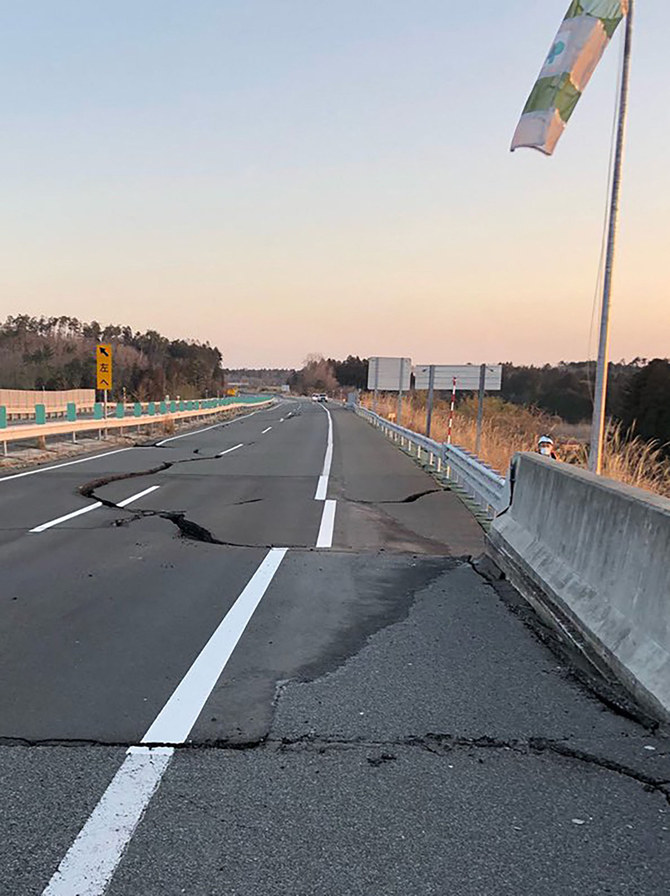
- The magnitude 7.4 quake, which struck shortly before midnight on Wednesday a
- It revived memories of the 2011 quake and tsunami off Fukushima that left some 18,000 dead
Russian tycoon Deripaska calls latest US sanctions ‘balderdash’

Since Russia’s invasion of Ukraine, Deripaska has been sanctioned by Britain for his alleged ties to Putin
FRANKFURT: Russian tycoon Oleg Deripaska dismissed the latest US sanctions on a series of companies that the US Treasury said were connected to a scheme to evade sanctions and unlock frozen shares as nonsense.
“This balderdash isn’t worth the time,” Deripaska said by message via a spokesperson in response a Reuters request for comment about the latest US sanctions.
“While the horrific war in Europe claims hundreds of thousands of lives every year, politicians continue to engage in their dirty games. I strongly believe that we need to do everything we can to establish peace, not serve the interests of warmongers,” he said.
The US Treasury on Tuesday announced it had sanctioned a web of Russian companies it said were being used to disguise ownership of a $1.6 billion industrial stake controlled by Deripaska.
Austria’s Raiffeisen Bank International was planning to buy the stake and dropped the transaction following mounting US pressure to abort the bid.
In its sanctions announcement, the US Treasury alleged it was an “attempted sanctions evasion scheme” to unfreeze a stake using “an opaque and complex supposed divestment.”
Since Russia’s invasion of Ukraine, Deripaska has been sanctioned by Britain for his alleged ties to Putin. He has mounted a legal challenge against the sanctions which he says are based on false information and ride roughshod over the basic principles of law and justice.
Deripaska, who made his fortune by buying up stakes in aluminum factories has also been subjected to sanctions by the United States, which in 2018 took measures against him and other influential Russians.
Those sanctions were “groundless, ridiculous and absurd,” Deripaska has previously said.
Outrage grows in India after Israel kills Indian army veteran

- Col. Waibhav Anil Kale was working for the UN Department of Safety and Security
- More than 190 UN staff killed since the beginning of Israel’s onslaught on Gaza
NEW DELHI: The killing of an Indian army veteran serving as a UN staffer in Gaza has stirred outrage in India and prompted calls for the government to hold Israel accountable.
Col. Waibhav Anil Kale was on duty with the UN Department of Safety and Security when his UN-marked vehicle was targeted in southern Gaza on Monday.
A former peacekeeper, he was hit on the way to the European Hospital in Rafah by what the UN said it had no doubt was Israeli tank fire.
The Indian Ministry of External Affairs issued a statement on Wednesday in response, saying it was “deeply saddened by the death” and that it was “in touch with relevant authorities” regarding an investigation into the incident.
The statement did not contain condemnation, unlike in July 2022, when two Indian peacekeepers were killed in an attack on a UN Organization Stabilization Mission base in the Democratic Republic of the Congo.
At that time, India’s foreign minister said the perpetrators “must be held accountable and brought to justice” and convened a special meeting of the UN Security Council to discuss the attack.
Talmiz Ahmad, former Indian ambassador to Saudi Arabia, told Arab News on Thursday that the government’s response was “grossly inadequate” given it was a “calculated killing” of an Indian army officer and UN staffer.
“The Indian government can hold Israel accountable. India is a sponsor of a resolution related to the protection of the UN personnel,” he said.
“This particular killing of a UN officer is a targeted killing because it was very obvious to Israelis that this was a UN vehicle, and it was on an official UN mission. A tank deliberately targeted this vehicle.”
New Delhi has always been sensitive to assaults on UN personnel given that it is one of the largest contributors of the organization’s peacekeepers.
The reaction to Kale’s killing was insufficient, according to Kavita Krishnan, a women’s rights activist.
“If a person is a UN employee, he is entitled to protection,” she said.
“The Indian government should specifically hold Israel accountable for this killing. They cannot treat it just as a casualty of war or collateral damage.”
Israel’s deadly siege and bombardment of Gaza has since October killed over 35,000 people, wounded 70,000, and left most of the enclave’s population starving and with no access to medical, food and water supplies.
The UN estimates that more than 190 of its staff members have also been killed in the ongoing onslaught. Kale was the first international UN employee to be killed.
“It’s condemnable that India does not name the fact of assassination. It’s not death. He did not die of illness. He was killed by Israel,” said Apoorvanand Jha, a public intellectual and professor at the University of Delhi.
“Israel kills people who are involved in the health services … kills journalists, aid workers and kills workers involved in the peacekeeping forces. So, it does it knowingly. It is not a collateral damage. Israel does it knowingly — this is what has been recorded many times. Israel needs to be held accountable for all the individual crimes of assassinations and the collective crimes, mass deaths.”
The killing of UN personnel goes against international humanitarian law.
“New Delhi should tell Tel Aviv that it should respect international law,” said Anwar Sadat, senior assistant professor at the Indian Society of International Law.
“The Indian government should issue a diplomatic demarche to the Israeli government.”
The government’s reaction was also seen as not boding well for the safety of Indian workers whom New Delhi has agreed to send to Israel.
Since the beginning of its invasion of Gaza, Israel has revoked work permits for tens of thousands of Palestinian laborers and sought to facilitate their replacement with manpower from South Asia.
In November, the Indian government signed a three-year agreement with Tel Aviv on the “temporary employment” of workers in the construction and caregiving sector.
“If this is the statement that the Indian government can bring for an official who works with the UN, imagine what if it happens with any of the workers. No one is going to speak,” said N. Sai Balaji, assistant professor at Jawaharlal Nehru University.
“This seriously compromises India’s super-power ambitions; it seriously compromises India’s own foreign policy.”
Mosque attack in Nigeria leaves 8 people dead, as police say the motive was a family dispute

- Four children were among the injured worshippers
- The incident caused panic in Kano, northern Nigeria’s largest state, where periodic religion-related unrest has occurred over the years
ABUJA: At least eight worshippers were killed and 16 others injured early Wednesday morning after a man attacked a mosque with a locally made explosive in northern Nigeria’s Kano state, resulting in a fire outbreak, the police said.
The suspect, a 38-year-old local resident, confessed that he attacked the mosque in Kano’s remote Gadan village “purely in hostility following (a) prolonged family disagreement,” police spokesman Abdullahi Haruna said in a statement on Wednesday.
Eight of those injured died later in a hospital, Haruna later told local Channels Television on Thursday. Four children were among the injured worshippers, although it was not clear if any of the children died.
The incident caused panic in Kano, northern Nigeria’s largest state, where periodic religion-related unrest has occurred over the years, sometimes resulting in violence.
The suspect invaded the mosque with “a locally prepared bomb and exploded it,” local police chief Umar Sanda told reporters. “It has nothing to do with terrorism.”
Footage broadcast by the local TVC station showed charred walls and burned furniture in the mosque, the main place of worship for Gadan village in Muslim-dominated Kano state.
Local media also reported the worshippers were locked inside the mosque, making it difficult for them to escape.
“Some children ran for their lives with fire all over them. We had to put water to quench it,” Hussaini Adamu, a resident, told TVC.
The police cordoned off the scene while the injured were rushed to a hospital in the state capital.
“The disagreement (was) over sharing of inheritance of which those that (the attacker) alleged to have cheated on him were in the mosque at that moment and he did that for his voice to be heard,” the police statement said.
What to expect as new, guitar-playing PM takes helm in Singapore

- Lawrence Wong went viral for his guitar cover of Taylor Swift’s ‘Love Story’ in March
- Best chapters of our Singapore story lie ahead, new PM said in inaugural speech
SINGAPORE: As Singapore gets a new prime minister for the first time in 20 years, experts have told Arab News what to expect from the city-state’s fourth leader, Lawrence Wong, who came to the fore with his handling of the successful COVID-19 response.
Wong was inaugurated on Wednesday evening, taking over the reins from Lee Hsien Loong, son of the founding father of modern Singapore Lee Kuan Yew.
The 51-year-old began his career as an economist at the trade ministry with a US educational background, before moving up to occupy some of the biggest jobs in Singapore’s bureaucracy, including the Energy Market Authority and Lee’s principal private secretary.
The civil servant-turned-politician was catapulted into the spotlight in 2020, when he coordinated Singapore’s successful fight against COVID-19. He has also garnered public support by showcasing his guitar skills online, including a cover of Taylor Swift’s “Love Story” that went viral in March.
“Lawrence Wong has been in charge with the COVID-19 pandemic, and he did very well. Singapore did very well by and large; that was something that the international community noticed,” said James M. Dorsey, a senior fellow at the Nanyang Technological University.
Compared with Lee, Wong will still have to work on his global exposure, but should be able to capitalize on the enduring image of Singapore’s “serious stability,” Dorsey added.
“As we watch the process of build-up toward the transition, we will have greater confidence in Lawrence Wong. And simply the confidence in the way Singapore does things, working in Wong’s favor.”
Southeast Asia analyst Adib Zalkapli is expecting Wong to continue the policies of his predecessor, who oversaw the country’s economic growth into an international financial hub and top tourist destination, more than doubling the island’s gross domestic product per capita.
“It’s a well-planned change of leadership that will ensure continuity. We are unlikely to see major policy changes in the short to medium term,” he told Arab News, adding that the same approach will likely apply on matters related to foreign policy.
Bridget Welsh, an honorary research associate at the Asia Research Institute in the University of Nottingham Malaysia, is also expecting continuity.
“Essentially status quo. Arguably, there will be more engagement, as issues remain complex in the region, and the new leadership will want to establish or deepen his own personal ties in the region,” Welsh said.
But so far, little is known about the policies Wong is likely to adopt, said Ian Chong, an associate professor of political science at the National University of Singapore.
“Lawrence Wong has said that he will bring continuity, make tough decisions, and is pro-Singapore. What these mean in practice is not yet known. Wong has not so far stated what his policy direction and vision is, why it is important, and why Singaporeans need to support it,” he said.
The new prime minister arrives at a particularly challenging time in geopolitics, a departure from a period of “stable external environment” that worked in Singapore’s favor.
“Intensifying US-PRC (People’s Republic of China) competition, internal circulation, on-shoring, friend-shoring, trade barriers, as well as data and technology in all the developed economies challenge Singapore’s business model,” Chong said.
“Wong has yet to articulate a plan on how he intends to deal with these challenges, even though he concedes their seriousness.”
In his first speech as prime minister, Wong paid tribute to his predecessors, but said that the country’s new leadership would adopt a style that “differs” from that of previous generations.
“We will lead in our own way. We will continue to think boldly and to think far. We know that there is still much more to do,” he said. “The best chapters of our Singapore story lie ahead.”
Outrage grows in India over UN staffer killed by Israeli forces in Gaza

- Army veteran Waibhav Anil Kale was working for UN Department of Safety and Security
- More than 190 UN staff killed since beginning of Israel’s onslaught on Gaza last year
NEW DELHI: The killing of an Indian army veteran serving as a UN staffer in Gaza has stirred outrage in India and calls for the government to hold Israel accountable, with activists calling New Delhi’s reaction ‘inadequate.’
Col. Waibhav Anil Kale, a former peacekeeper, was on duty with the UN Department of Safety and Security when his UN-marked vehicle was hit on Monday en route to the European Hospital in Rafah by what the international organization said was Israeli tank fire.
The Indian government’s response was a condolence statement issued on Wednesday by the Ministry of External Affairs, saying it was “deeply saddened by the death” and “in touch with relevant authorities” regarding an investigation.
The statement did not issue a condemnation, unlike in July 2022, when two Indian peacekeepers were killed in an attack on a UN Organization Stabilization Mission base in the Democratic Republic of the Congo. At that time, India’s foreign minister said the perpetrators “must be held accountable and brought to justice” and convened a special meeting of the UN Security Council to discuss the attack.
Talmiz Ahmad, former Indian ambassador to Saudi Arabia, said the government’s response was “grossly inadequate” given what he called the “calculated killing” of an Indian army officer and UN staffer.
“The Indian government can hold Israel accountable. India is a sponsor of a resolution related to the protection of the UN personnel,” he told Arab News.
“This particular killing of a UN officer is a targeted killing because it was very obvious to Israelis that this was a UN vehicle, and it was on an official UN mission. A tank deliberately targeted this vehicle.”
New Delhi had always been sensitive to assaults on UN personnel given that it is one of the largest contributors to the organization’s peacekeepers.
The reaction to Kale’s killing was insufficient, according to Kavita Krishnan, a women’s rights activist.
“If a person is a UN employee, he is entitled to protection,” she said. “The Indian government should specifically hold Israel accountable for this killing. They cannot treat it just as a casualty of war or a collateral damage.”
“IT’S NOT A DEATH”
Since October last year, Israel’s deadly siege and bombardment of Gaza has killed more than 35,000 people, wounded 70,000, and left most of the enclave’s population starving and with no access to medical, food and water supplies.
The UN estimates that more than 190 of its staff members have also been killed in the ongoing onslaught. Kale was the first international UN employee to be killed.
“It’s condemnable that India does not name the fact of assassination. It’s not death. He did not die of illness. He was killed by Israel,” said Apoorvanand Jha, a public intellectual and professor at the University of Delhi.
“Israel kills people who are involved in the health services ... kills journalists, aid workers and kills workers involved in the peacekeeping forces. So, it does it knowingly. It is not a collateral damage. Israel does it knowingly — this is what has been recorded many times. Israel needs to be held accountable for all the individual crimes of assassinations and the collective crimes, mass deaths.”
From a legal point of view, the killing of UN personnel is against norms and customs of international law and international humanitarian law.
“New Delhi should tell Tel Aviv that it should respect international law,” said Anwar Sadat, a senior assistant professor at the Indian Society of International Law.
“The Indian government should issue a diplomatic demarche to the Israeli government.”
Since the beginning of its invasion of Gaza, Israel has revoked work permits for tens of thousands of Palestinian laborers and sought to facilitate their replacement with manpower from South Asia.
In November, the Indian government signed a three-year agreement with Tel Aviv on the “temporary employment” of workers in the construction and caregiving sector.
“If this is the statement that the Indian government can bring for an official who works with the UN, imagine what if it happens with any of the workers. No one is going to speak,” said N. Sai Balaji, assistant professor at Jawaharlal Nehru University.
“This seriously compromises India’s super-power ambitions, it seriously compromises India’s own foreign policy.”





